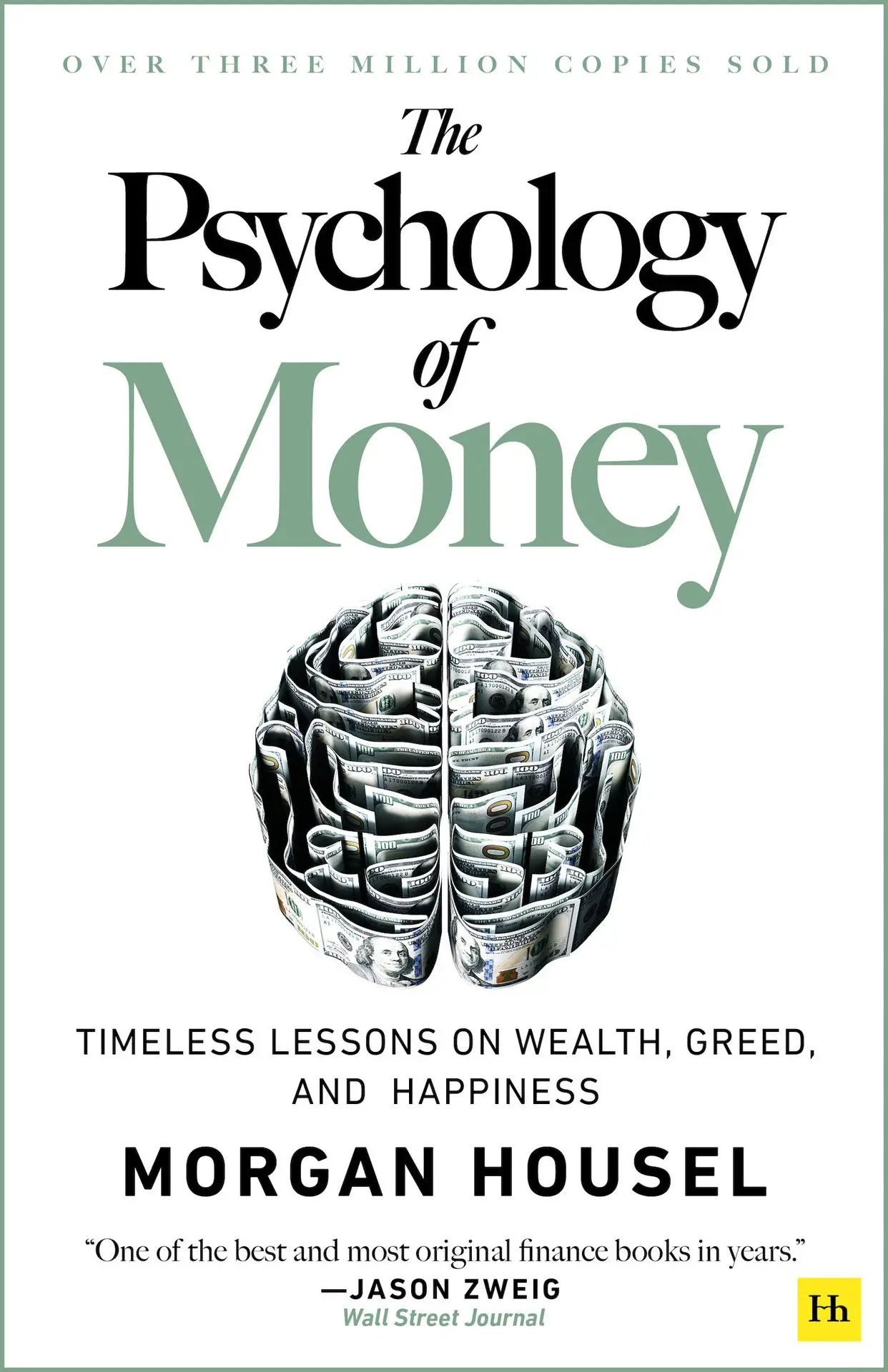The Psychology of Money Book Summary

[adinserter block=”1″]
1 Line summary of the Book
“The Psychology of Money” by Morgan Housel is a thought-provoking and insightful exploration of the role that psychology plays in money and investing, offering practical advice for individuals looking to improve their financial situations.
Introduction
Morgan Housel’s book, “The Psychology of Money,” is a fascinating read that challenges conventional wisdom about money and investments. In this article, we have provided a Book Summary of The Psychology of Money, a Book by Morgan Housel who is a former Wall Street analyst and now a partner at Collaborative Fund, a venture capital firm that invests in innovative startups. In his book, he uses his experience in the finance industry to explore the psychology of money and why some people make better financial decisions than others.
The importance of time
Housel emphasizes the importance of time when it comes to investing. He argues that the most successful investors are those who have a long-term perspective and are patient. He writes, “The single greatest thing you can do for your wealth is to be patient. Simple math tells us the longer your time horizon, the more likely you are to earn a positive return.”
[adinserter block=”2″]
The role of luck
Housel also acknowledges the role of luck in investing. He writes, “The line between luck and skill in investing is thin, blurry, and often debated. But luck is the primary driver of outcomes in the short term.” He goes on to explain that luck can be both positive and negative and that investors need to be aware of the role that luck plays in their success or failure.
The power of compounding
Another key point that Housel makes is the power of compounding. He writes, “Compounding is the most powerful force in the universe. It’s what allows the creation of knowledge, wealth, and happiness.” He explains that even small amounts of money can grow into significant sums over time if they are invested wisely.
The value of simplicity
Housel also emphasizes the value of simplicity in investing. He argues that complex investment strategies often lead to poor performance, as they can be difficult to understand and execute. He writes, “The best investment strategy is the one you can stick with.”
The danger of overconfidence
Housel warns against the danger of overconfidence in investing. He writes, “Overconfidence is the enemy of good investing. It leads to underestimating risk and overestimating your ability to control outcomes.” He explains that overconfidence can lead investors to take unnecessary risks and make poor investment decisions.
The importance of saving
Finally, Housel stresses the importance of saving when it comes to building wealth. He writes, “The only way to get rich for the long term is to save.” He explains that saving is more important than investing, as even the best investments can be wiped out if investors are not saving enough.
[adinserter block=”4″]
Conclusion
In conclusion, “The Psychology of Money” is a must-read for anyone interested in personal finance or investing. Housel’s insights into the psychology of money are both enlightening and practical, and his writing style is engaging and easy to understand. The key points from the book are that time, luck, compounding, simplicity, avoiding overconfidence, and saving are critical factors in building wealth. By following these principles, investors can increase their chances of success in the financial markets.
BUY “The Psychology of Money”
“The Psychology of Money” by Morgan Housel is a thought-provoking and insightful exploration of the role that psychology plays in money and investing, offering practical advice for individuals looking to improve their financial situations.
Brief summary of Chapters “The Psychology of Money“
- The Seduction of Pessimism: The importance of a positive outlook when it comes to money and investing.
- Saving is a Difficult and Weird Thing: The challenges of saving money and why it’s so important.
- Never Enough: The idea that people are often unsatisfied with what they have, no matter how much money they earn or accumulate.
- The Dangers of Purity: The risks associated with investing only in one asset class or market.
- You and Me: The importance of understanding our individual financial situations and goals.
- Confounding Compounding: The incredible power of compounding returns over time.
- Getting Wealthy vs. Staying Wealthy: The differences between accumulating wealth and preserving it over time.
- Tails, You Win The importance of being prepared for outlier events that can have a significant impact on investment portfolios.
- Freedom: The relationship between money and freedom, and how it affects our financial decisions.
- Man in the Car Paradox: The idea that our financial decisions are often influenced by our surroundings and social status.
- Wealth is What You Don’t See: The hidden costs of accumulating wealth, such as opportunity costs and lifestyle inflation.
- Save Money: The importance of saving money and how it’s often more important than investing.
- Reasonable > Rational: The idea that being reasonable is often more important than being rational when it comes to financial decision-making.
- Surprise!: The importance of being prepared for unexpected events, both positive and negative.
- Room for Error: The need for a margin of safety in investing and financial decision-making.
- Nothing’s Free: The hidden costs of financial products and services.
- You’ll Change: How our values and priorities can change over time, and how it affects our financial decisions.
- You and Me, Version 2.0: The importance of understanding our individual financial situations and goals, revisited.
- The Seduction of Pessimism, Revisited: The dangers of being too pessimistic about the future and the potential consequences of not taking action.
- Saving is About Flexibility: The idea that saving money is not only about accumulating wealth, but also about having flexibility and options in life.
[adinserter block=”6″]
“The Psychology of Money” Book By Morgan Housel

Must Read Book to understand the psychology of Money
- “No one is impressed with your possessions as much as you are.”
- “The highest form of wealth is the ability to wake up every morning and say, ‘I can do whatever I want today.'”
- “Good investing is not necessarily about making good decisions. It’s about consistently not screwing up.”
- “The ability to do what you want, when you want, with who you want, for as long as you want, is priceless.”
- “Compounding is the most powerful force in the universe.”
Best lines of “The Psychology of Money“
Sure, here are some of the best lines from “The Psychology of Money” by Morgan Housel:
- “No one is impressed with your possessions as much as you are.”
- “The highest form of wealth is the ability to wake up every morning and say, ‘I can do whatever I want today.'”
- “Good investing is not necessarily about making good decisions. It’s about consistently not screwing up.”
- “The ability to do what you want, when you want, with who you want, for as long as you want, is priceless.”
- “Compounding is the most powerful force in the universe.”
- “Money is everywhere, it’s abundant, it’s cheap. But time is scarce, and it’s the only thing of real value.”
- “A lot of personal finance is just that: personal.”
- “It’s hard to predict what will happen, but it’s not hard to prepare for what might happen.”
- “To build wealth, you need to increase your savings rate. And the only way to do that is to increase your income or decrease your spending.”
- “Investing is not the study of finance. It’s the study of how people behave with money.”
Lessons to learn from “The Psychology of Money“
There are several lessons to learn from “The Psychology of Money” by Morgan Housel. Here are some of the key takeaways:
- Time is your most valuable asset when it comes to investing. The longer your time horizon, the greater your chances of success.
- Luck plays a significant role in investing, and it’s important to be aware of the impact it can have on your outcomes.
- Compounding is a powerful force that can turn small amounts of money into significant sums over time.
- Simple investment strategies are often more effective than complex ones, as they are easier to understand and execute.
- Overconfidence can be dangerous when it comes to investing, leading to unnecessary risks and poor decision-making.
- Saving money is crucial for building wealth and achieving financial freedom.
- It’s important to be prepared for unexpected events that can have a significant impact on your investments and financial situation.
- Being reasonable is often more important than being rational when it comes to financial decision-making.
- Hidden costs can erode the returns of financial products and services, so it’s important to be aware of them.
- Understanding your individual financial situation and goals is crucial for making sound financial decisions.
[adinserter block=”7″]
Best quotes of “The Psychology of Money“
Sure, here are some of the best quotes from “The Psychology of Money” by Morgan Housel:
- “The highest form of wealth is the ability to wake up every morning and say, ‘I can do whatever I want today.'”
- “Investing is not the study of finance. It’s the study of how people behave with money.”
- “No one is impressed with your possessions as much as you are.”
- “The ability to do what you want, when you want, with who you want, for as long as you want, is priceless.”
- “The best investment strategy is the one you can stick with.”
- “The line between luck and skill in investing is thin, blurry, and often debated. But luck is the primary driver of outcomes in the short term.”
- “The single greatest thing you can do for your wealth is to be patient. Simple math tells us the longer your time horizon, the more likely you are to earn a positive return.”
- “The most important thing about money is what it means to you.”
- “Compounding is the most powerful force in the universe.”
- “Good investing is not necessarily about making good decisions. It’s about consistently not screwing up.”
- “Wealth is not the same thing as money. Wealth is what you don’t see.”
- “The key to getting rich is not picking the right investment, but being persistent and disciplined in saving and investing over a long period of time.”
- “The ability to adapt is more important than being smart or talented when it comes to achieving financial success.”
- “To build wealth, you need to increase your savings rate. And the only way to do that is to increase your income or decrease your spending.”
- “Money is everywhere, it’s abundant, it’s cheap. But time is scarce, and it’s the only thing of real value.”
Frequently Asked Questions (FAQs) about “The Psychology of Money” by Morgan Housel
Q.1 Who is Morgan Housel?
Morgan Housel is a former Wall Street analyst and a partner at Collaborative Fund, a venture capital firm that invests in innovative startups. He is also a popular writer and commentator on personal finance and investing.
Q.2 What is “The Psychology of Money” about?
“The Psychology of Money” explores the psychology of money and why some people make better financial decisions than others. The book challenges conventional wisdom about money and investing, and offers practical advice for individuals looking to improve their financial situations.
Q.3 What are some of the key takeaways from “The Psychology of Money”?
Some of the key takeaways from the book include the importance of time, luck, and compounding in investing; the value of simplicity and avoiding overconfidence; the need for saving and margin of safety; and the importance of understanding your individual financial situation and goals.
Q.4 Who should read “The Psychology of Money”?
“The Psychology of Money” is a must-read for anyone interested in personal finance or investing. It is written in an engaging and easy-to-understand style, making it accessible to readers of all levels of financial literacy.
Q.5 Is “The Psychology of Money” a good book for beginners?
Yes, “The Psychology of Money” is a great book for beginners who are looking to learn more about personal finance and investing. The book covers a wide range of topics in an accessible and practical way, making it an ideal starting point for anyone looking to improve their financial situation.
Q.6 How is “The Psychology of Money” different from other personal finance and investing books?
“The Psychology of Money” is unique in its focus on the psychological aspects of money and investing. While other books may focus more on technical analysis or specific investment strategies, “The Psychology of Money” emphasizes the role that psychology plays in financial decision-making, and offers practical advice for overcoming common psychological biases.
Q.7 What is the writing style of “The Psychology of Money”?
The writing style of “The Psychology of Money” is engaging and easy to read, with plenty of anecdotes and real-world examples to illustrate key points. The book is divided into short chapters, making it easy to read in small increments, and the overall tone is friendly and conversational.
Q.8 Is “The Psychology of Money” a good book for people who are not interested in finance?
Yes, “The Psychology of Money” is a good book for anyone who is interested in understanding the psychology of money and how it affects our lives. The book covers a wide range of topics that are relevant to anyone, regardless of their interest in finance, and the writing style is engaging and accessible.
